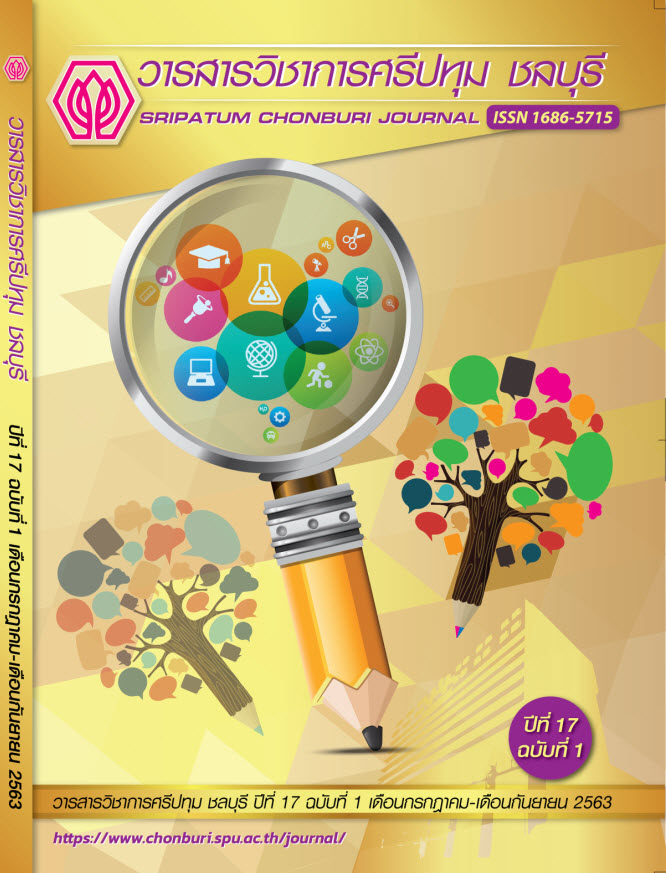DEVELOPMENT ON COOPERATIVE LEARNING MANAGEMENT IN ORDER TO MODEL AFTER THE LESSON ABOUT THE SUFFICIENCY ECONOMY PHILOSOPHY ON MAKING THAI SWEETS USED IN FESTIVALS AND AUSPICIOUS EVENTS CAREER AND TECHNOLOGY SUBSTANCE OF LEARNING GROUP, MATTHAYOM 2 (SECONDARY 2)
Keywords:
cooperative learning, the sufficiency economy philosophy, Thai desserts.Abstract
The objectives of this research are: 1) to study the background information and needs of the development of learning management, learning, occupation, and technology, 2) to design a model of cooperative learning management to remove lessons, 3) to experiment with a cooperative learning management model to transcribe the lessons, and 4) to evaluate and improve the cooperative learning management model in order to take the lessons of the sufficiency economy philosophy on making Thai desserts at festivals and auspicious events, part of career and technology learning group, mathayom 2 (secondary 2). The sample group was thirty-one students in mathayom 2 (secondary 2) in semester 1 academic year 2019. They are studying in Municipality School 1 (Sangkhawit). The researcher used a random sampling method, including a form of suitability assessment form to measure academic achievement and student behavior assessments expressed on the philosophy of sufficiency economy. The data were analyzed by percentage, mean, standard deviation, t-test (dependent) statistics, and content analysis.
The results of fundamental data analysis and development needs of learning management for training learners to think, act rationally, and behave prerogatively in various fields by operating activities that lead to sustainability of results where the students have the knowledge and understand the philosophy of sufficiency economy. It leads to dissemination to families and communities. The results of creating a cooperative learning management model for removing the lessons from the philosophy of sufficiency economy make Thai desserts in festivals and auspicious events (career and technology learning matthayom 2). The PPCC Model format consists of four steps: planning, presentation, cooperative to learning, and conclusion and assessment. The trial management model for cooperative learning lessons to the philosophy of sufficiency economy - an experiment with a sample - the efficiency value of 83.18/83.87. Before and after the study, the comparison of academic achievement showed that the mean score before class was 10.84 and after class was 25.16. It indicated that the differences were statistically significant at the .01 level. The student behavior assessment that expresses the philosophy of sufficiency economy as a whole is at a high level. Evaluating the satisfaction of the students is overall is at a high level.
References
จันทร์จิรา สาแก้ว. (2560). การพัฒนารูปแบบการเรียนการสอนแบบ LEC เพื่อเสริมสร้างหลักปรัชญาของเศรษฐกิจพอเพียง เรื่อง น้ำพริกสมุนไพรไทยในท้องถิ่น
กลุ่มสาระการเรียนรู้การงานอาชีพและเทคโนโลยี ชั้นมัธยมศึกษาปีที่ 3. สุรินทร์: โรงเรียนบ้านไกลเสนียด สำนักงานเขตพื้นที่การศึกษาประถมศึกษาสุรินทร์ เขต 2.
มาเรียม นิลพันธุ์ และคณะ. (2554). การพัฒนารูปแบบการจัดการเรียนรู้ตามหลักปรัชญาของเศรษฐกิจพอเพียงในรายวิชาชีพครู กรณีคณะศึกษาศาสตร์ มหาวิทยาลัยศิลปากร.
นครปฐม: คณะศึกษาศาสตร์ มหาวิทยาลัยศิลปากร.
เทศบาลนครตรัง. (2561). แผนยุทธศาสตร์การพัฒนาของเทศบาลนครตรัง พ.ศ. 2558-2563. ตรัง: เทศบาลนครตรัง.
โรงเรียนเทศบาล 1 (สังขวิทย์). (2561). รายงานการประเมินตนเอง (self assessment report: SAR). ตรัง: โรงเรียนเทศบาล 1 (สังขวิทย์).
ธนาอร เผ่าชู. (2561). รูปแบบการจัดการเรียนรู้ตามแนวคิดการจัดการความรู้ เพื่อส่งเสริมสมรรถนะทางคอมพิวเตอร์ กลุ่มสาระการเรียนรู้การงานอาชีพและเทคโนโลยี
ชั้นประถมศึกษาปีที่ 6. พัทลุง: โรงเรียนเทศบาลวัดธาราสถิตย์.
สุเมธ ตันติเวชกุล. (2554). หลักธรรมตามรอยพระยุคลบาท. กรุงเทพฯ: ด่านสุทราการพิมพ์.
สำนักงานคณะกรรมการการศึกษาขั้นพื้นฐาน. (2555). กลยุทธ์การบริหารสถานศึกษาขั้นพื้นฐานโดยใช้หลักปรัชญาของเศรษฐกิจพอเพียง. กรุงเทพฯ: กระทรวงศึกษาธิการ.
อภินภัศ จิตรกร. (2559). การจัดการเรียนรู้แบบศิลปะเป็นฐานเพื่อส่งเสริมความคิดสร้างสรรค์ของผู้เรียนในศตวรรษที่ 21. วารสารศึกษาศาสตร์ มหาวิทยาลัยศิลปากร, 14(1),
หน้า 60-72.
Downloads
Published
Issue
Section
License
บทความทุกบทความเป็นลิขสิทธิ์ของวารสารวิชาการศรีปทุม ชลบุรี



